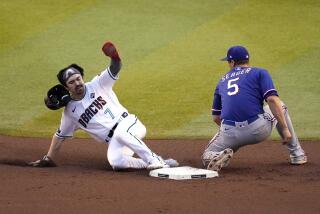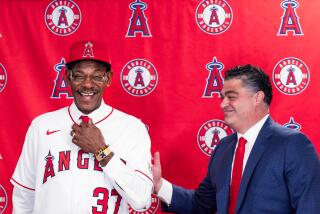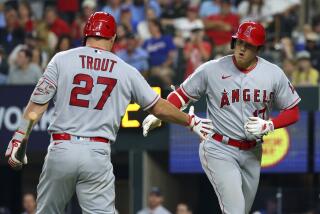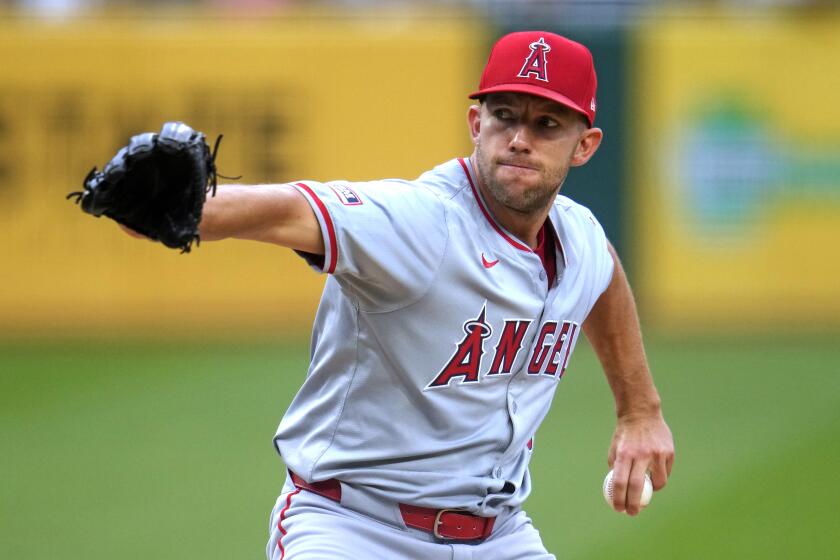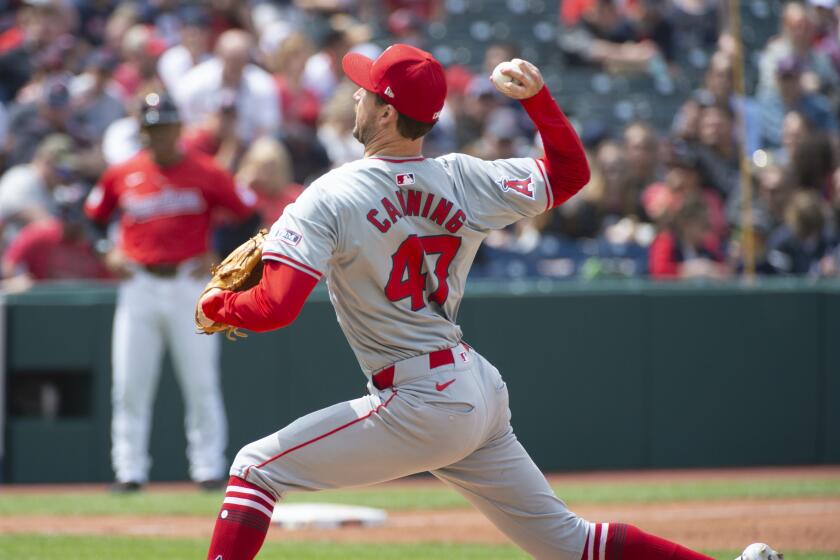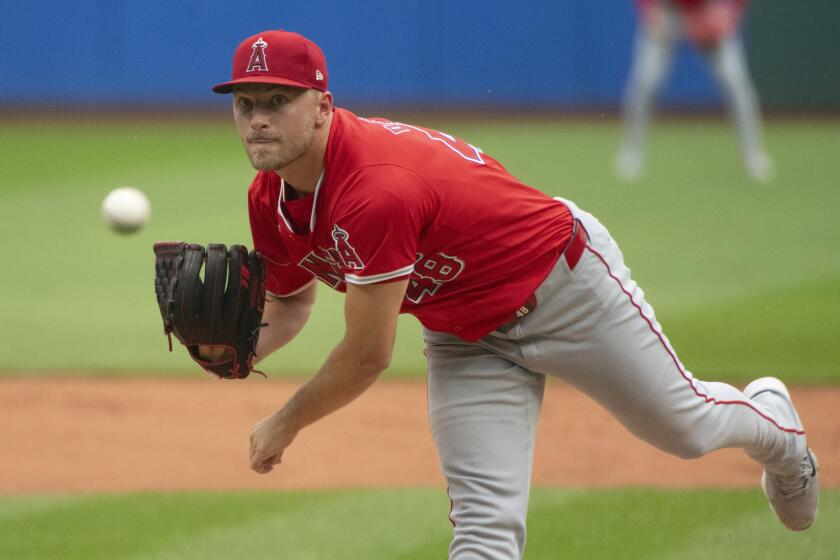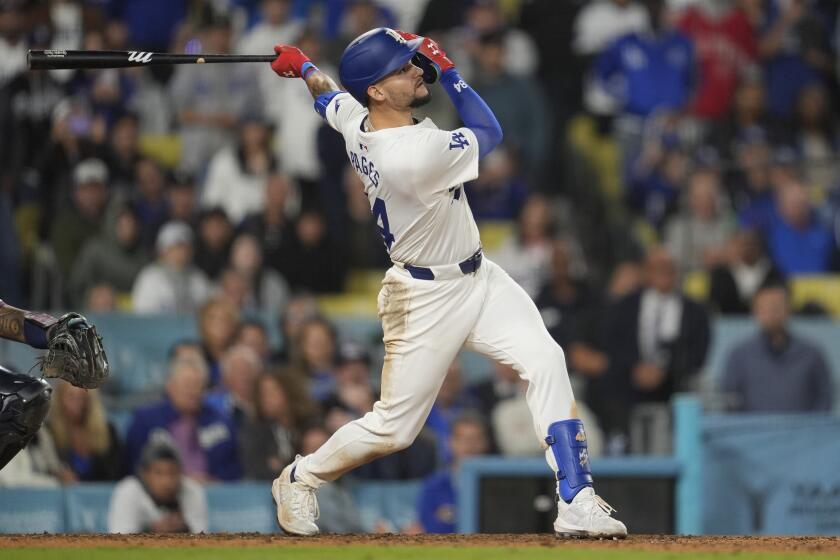Ian Kinsler once vowed never to play for the Angels. Now he’s fitting right in
There are situations when playing for a certain team can be too good to be true.
Then there are others, when the circumstances can be too true to be good.
“I’m not going to lie,” Ian Kinsler said. “There were times when I was a young player in the league when I said I’ll never play with the Angels.”
But there he was — now a 35-year-old — at the start of spring training, strolling into the home clubhouse here, changing into a bright-red T-shirt and pulling a cap with a halo on it over his head.
The team’s new second baseman had two months to absorb his December trade from Detroit. But Kinsler still felt a little out of place, sort of like a Rally Monkey wrapped in Dodger blue.
He spent the first eight seasons (2006-13) of his big-league career with Texas, his scrappy play and brash personality stoking an already-heated American League West rivalry with the Angels.
The Rangers had an 81-71 record against the Angels in that span, twice winning division titles and advancing to the World Series. The Angels won the AL West three straight seasons, from 2007 to 2009.
Primarily leading off, Kinsler had an .804 on-base-plus-slugging percentage with 156 homers, 539 RBIs and 748 runs in those eight years. More to the point: He was hit by 57 pitches, nine times by the Angels, his most against any opponent.
There was one particularly memorable night in Texas, on May 16, 2009, when Kinsler led off opposite then-Angels ace John Lackey.
The first fastball sailed behind the head of Kinsler, who had homered twice off the Angels the night before. The second hit Kinsler in the ribs and Lackey was immediately ejected, his night over after two pitches.
“I think it was just the rivalry in general — they didn’t like me, I didn’t like them, you know?” Kinsler said. “I don’t know if there was one thing that sparked it. The Angels, at the time, dominated the AL West, and as the tide started to change, it became more of a rivalry. I think I was a little bit of a thorn in their side.”
Or a pain in a spot slightly lower, Kinsler’s fiery emotions such that, after he was traded by Texas to the Tigers in 2013, he said he hoped the Rangers would finish “0-162.”
He since has explained that the comment came from a younger, too publicly passionate version of himself. On the field, however, Kinsler’s salty reputation remains unchanged.
“He’s an annoying player to play against,” Angels shortstop Andrelton Simmons said. “I don’t think anybody really dislikes him. Some players are easy to hate. I don’t think he’s one of those. But he is an annoying opposing player … and a great teammate.”
Simmons said the problem in dealing with Kinsler is his relentless habit of being a pest — fouling off potential third strikes, blooping singles into the tightest of spaces, seizing game-winning moments.
“That’s not the sort of guy you like facing,” Simmons said, “unless you’re winning by like 20.”
The Angels hope Kinsler can upgrade a position that has been an unanswered question since Howie Kendrick was traded after the 2014 season.
Neither Johnny Giavotella, the primary starter in 2015 and ’16, nor Danny Espinosa, the starter in ’17 before being released in July, distinguished himself.
The same goes for a lengthy cast of fill-ins that included Taylor Featherston, Grant Green, Cliff Pennington, Kaleb Cowart and Brandon Phillips.
Angels second basemen ranked 23rd, 28th and 30th — yeah, that’s last — in OPS in baseball the last three seasons, respectively.
“He’s a guy who brings a lot of energy to a clubhouse, a good veteran presence,” Angels left fielder Justin Upton said of Kinsler, his former teammate in Detroit. “I thought he’d be a good fit here. I enjoyed being with him, and I think the guys in here will, too.”
The Angels will enjoy Kinsler more if he can bounce back from a career-worst season in which he hit .236 with a .313 OBP and .412 slugging percentage, well below his career slash line of .273/.342/.447. Though he did hit 22 home runs, Kinsler finished with just 52 RBIs.
Still, the Detroit News named him the Tigers’ most valuable player and FanGraphs noted that a deeper inspection of the math on Kinsler doesn’t reveal a player in steep decline.
Compared with the year before, he struck out fewer times last season and walked more. Kinsler also hit the ball on average as hard as he did in ’16, FanGraphs explaining that his poorer slash line could have been the result of simple bad luck.
“I felt like I underperformed,” Kinsler said. “I was healthy the whole year. I felt great. Offensively, I left some things on the table. If they say I was unlucky, cool. Maybe I’ll be lucky this year.”
Kinsler gives the Angels another option to lead off, along with Kole Calhoun and Zack Cozart. But he doesn’t have a batting-order preference.
He also brings more defense to a team potentially swelling with the stuff. Along with Simmons and his three Gold Glove awards, the Angels have an above-average shortstop and athlete in Zack Cozart moving to third base.
Kinsler won a Gold Glove in 2016 and already — without having played in a single spring training game — wowed Simmons defensively; and wowing Simmons defensively is doing something, given his standards.
It was during drills on a back field when Kinsler charged a slow-rolling grounder and, using only his glove, secured the ball and flipped it behind his back, hitting Simmons’ glove, chest-high.
“He never caught it,” Simmons said, smiling. “He just changed the ball’s direction. And it was firm, right at me. He’s either really lucky or really good. Either way, it was so impressive. I want to see him do it again, just to be sure.”
And that’s the Angels’ new second baseman, a former enemy now making plays — and friends — in the strangest of places.
More to Read
Go beyond the scoreboard
Get the latest on L.A.'s teams in the daily Sports Report newsletter.
You may occasionally receive promotional content from the Los Angeles Times.
